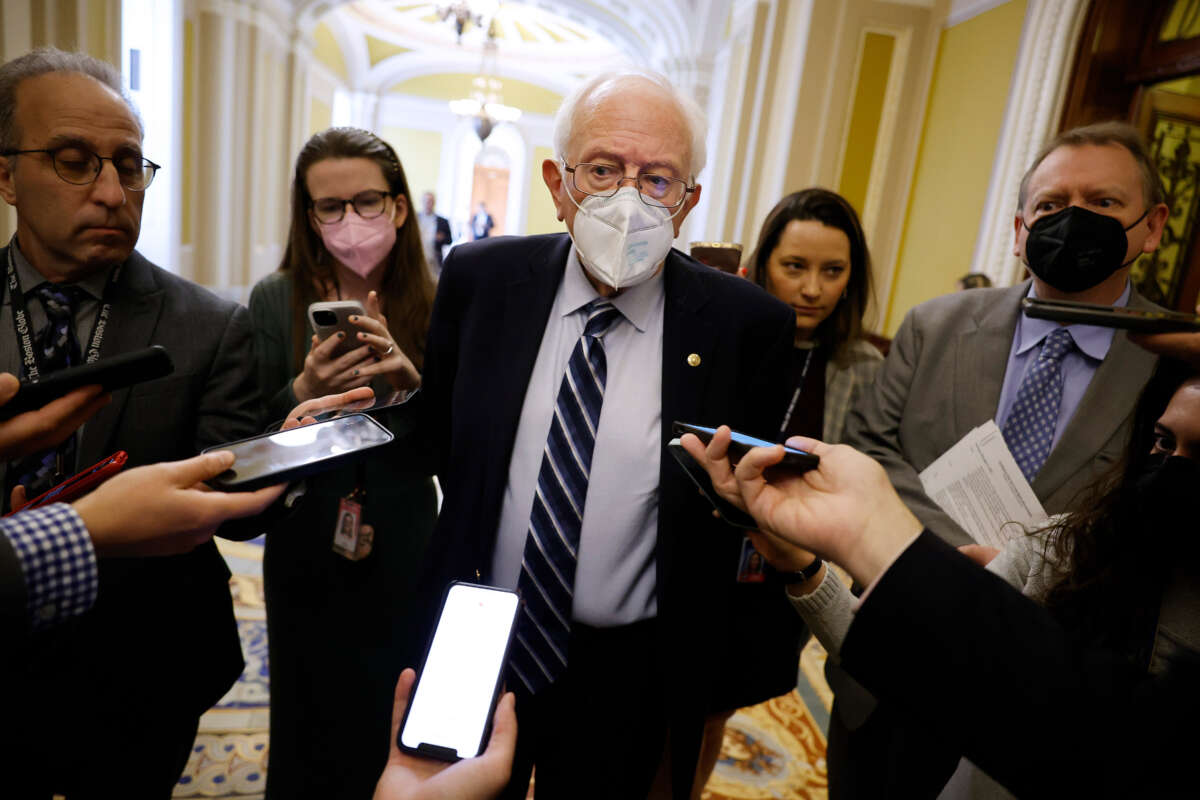Truthout is a vital news source and a living history of political struggle. If you think our work is valuable, support us with a donation of any size.
Sen. Bernie Sanders (I-Vermont) is planning to bring a resolution aimed at ending U.S. support for the Saudi Arabia-led war in Yemen to a vote in the Senate as early as next week, saying it could have the votes to pass.
Sanders told The Intercept this week that he will put a war powers resolution to a vote, which can be done without the backing of Senate leadership because of the nature of the resolution and the time that has elapsed since the Vermont senator and his colleagues introduced it earlier this year. When it was introduced earlier this year, the resolution had the backing of over 100 House members from both sides of the aisle.
A similar version of the resolution passed Congress on an overwhelmingly bipartisan basis in 2019, but Donald Trump vetoed it. Senators contacted by The Intercept who had previously supported the resolution said that they are waiting to see the current version to decide whether they will support it again.
The version of the resolution introduced this summer would end the U.S.’s logistical and intelligence-related support for the Saudis, while also barring U.S. military personnel from being assigned to aid Saudi forces without statutory authorization.
“We must put an end to the unauthorized and unconstitutional involvement of U.S. Armed Forces in the catastrophic Saudi-led war in Yemen and Congress must take back its authority over war,” Sanders said of the resolution in July. “This war has created the world’s worst humanitarian crisis today and it is past time to end U.S. complicity in those horrors. Let us pass this resolution, so we can focus on diplomacy to end this war.”
Antiwar advocates say that the resolution can play a crucial role in helping to extend peace in Yemen.
“It’s welcome news that Senator Sanders is planning to force a vote on the Yemen War Powers Resolution to end U.S. complicity in the Saudi-led war on Yemen,” Hassan El-Tayyab, legislative director for Middle East policy for the Friends Committee on National Legislation, told Truthout.
“By removing the possibility of more U.S. support for Riyadh and its partners to renew airstrikes in Yemen, Congress can play a constructive role to keep the pressure on the Saudis to negotiate an extension of the truce,” El-Tayyab continued. “They can also send a signal to Saudi Arabia that its decision to manipulate global energy markets was an unnecessary and politically-motivated, hostile action that will exacerbate inflation in the U.S. and around the world, and aid Russia in its invasion of Ukraine.”
El-Tayyab added that the resolution is the most viable pathway to end the U.S.’s role in supporting Saudi-led forces because of its ability to pass swiftly with little delay in Congress.
Anti-war and humanitarian advocates have long called for an end to the U.S.’s involvement in the war in Yemen, which has killed hundreds of thousands of civilians and has created one of the world’s largest humanitarian crises, according to the UN, with millions of people displaced and three-quarters of Yemenis in need of humanitarian aid. Russia’s war in Ukraine has exacerbated the already devastating food shortage in the country.
The U.S. has long been deeply involved in the war despite the fact that Congress had never authorized support for Saudi Arabia in the conflict. A ceasefire agreement recently expired, and the passage of the resolution could send the signal to Saudi Arabia that it does not have the U.S.’s backing to resume attacks.
The resolution would follow through on a pledge from President Joe Biden to end the U.S.’s participation in the war that he reneged on last year, much to the disappointment of progressives and humanitarian advocates. Biden has kept Trump-era policies on the war rather than moving toward diplomatic solutions and ending U.S. support of Saudi forces, as advocates had hoped for.
In recent months, progressives say Biden has also exacerbated the situation by cozying up to Saudi leaders, seeking immunity status for Saudi Crown Prince and Prime Minister Mohammed bin Salman for his role in the murder of journalist Jamal Khashoggi.
A terrifying moment. We appeal for your support.
In the last weeks, we have witnessed an authoritarian assault on communities in Minnesota and across the nation.
The need for truthful, grassroots reporting is urgent at this cataclysmic historical moment. Yet, Trump-aligned billionaires and other allies have taken over many legacy media outlets — the culmination of a decades-long campaign to place control of the narrative into the hands of the political right.
We refuse to let Trump’s blatant propaganda machine go unchecked. Untethered to corporate ownership or advertisers, Truthout remains fearless in our reporting and our determination to use journalism as a tool for justice.
But we need your help just to fund our basic expenses. Over 80 percent of Truthout’s funding comes from small individual donations from our community of readers, and over a third of our total budget is supported by recurring monthly donors.
Truthout’s fundraiser ended last night, and we fell just short of our goal. But your support still matters immensely. Whether you can make a small monthly donation or a larger one-time gift, Truthout only works with your help.
